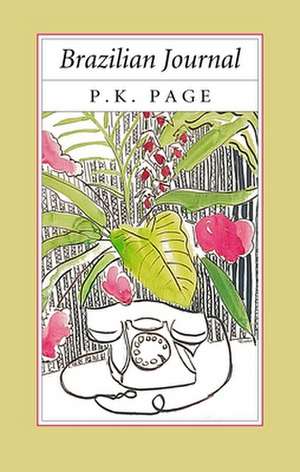Brazilian Journal: Collected Works of P K Page, cartea 2
Autor P.K. Pageen Limba Engleză Paperback – 30 noi 2011
Vezi toate premiile Carte premiată
IndieFab awards (2011)
A memory of Brazil and its natural beauty evokes calm, and a strange benediction, as poet P. K. Page recalls (for example) two coloured birds which alight on her husband, Arthur, at dusk, in Rio de Janeiro. Page's three years in Brazil, from 1957 to 1959, retain this luminous, slightly surreal quality in the poet's memory, baroque' she once called its landscape and culture.
Preț: 155.26 lei
Nou
Puncte Express: 233
Preț estimativ în valută:
29.71€ • 31.02$ • 24.59£
29.71€ • 31.02$ • 24.59£
Carte indisponibilă temporar
Doresc să fiu notificat când acest titlu va fi disponibil:
Se trimite...
Preluare comenzi: 021 569.72.76
Specificații
ISBN-13: 9780889843479
ISBN-10: 0889843473
Pagini: 303
Dimensiuni: 140 x 218 x 30 mm
Greutate: 0.5 kg
Ediția:Revised
Editura: Porcupine's Quill
Seria Collected Works of P K Page
ISBN-10: 0889843473
Pagini: 303
Dimensiuni: 140 x 218 x 30 mm
Greutate: 0.5 kg
Ediția:Revised
Editura: Porcupine's Quill
Seria Collected Works of P K Page
Recenzii
'Elegant, rigorous, fresh, P. K. Page's work sings with a voice of independent character and maenad conjecture. It is a creature that lives on its own terms and terrain. It is startling, authoritative, and anti-sentimental, able to bear cool as well as passionate gazing at our own species. Her poems are always thinking -- each line is thinking, while its six senses remain impeccably alert. Her poems live by wit, wisdom, sass, suspense and a muscular lissome synapse and diction. They are daring in scope, meticulous in accomplishment, and boldly moral -- with a lovely flavour of amoral verve! We fall under the charm of her reasoning, of her fecund, fastidious imagination, of her many musics, and of her necessariness to us, her essentialness.' -- Griffin Prize citation 'There is an irony to moving: while the primary change seems to be an external one, it is often the subtle, internal one that is the most profound. The more exotic the locale, the more exotic the inner change. Canadian poet P.K. Page tracks the course of this transformation in her book Brazilian Journal. In 1957, Page moved to Brazil with her husband, where he was assigned as Canadian ambassador. Loath to move there at first, she is slowly drawn in by Brazil and soon comes to love it. Gradually, a change takes place. While a writer by trade, Page begins to gravitate towards the visual, becoming entranced by Brazil's natural beauty, eventually turning from poetry to drawing and painting in an effort to capture her surroundings.'Despite being seduced by the outer world, Page's journal entries remain rich in observation. Each page luxuriates in description of the nature -- an insect with "black lace wings and a green brocade head and a noise like a DC-3 revving up" finds its way into Page's bedroom, the world "throbs" with green, and a "wild palm leggy as colts" appears before her on a bay. Most of Page's entries are filled with this kind of reverent, indulgent description, roping the reader in and making Brazil's beauty visceral. In fact, Page's writing is often observational at the expense of the personal -- the reader rarely, if ever, is allowed into her inner life, though this doesn't mean it isn't there. Indeed, Page, who passed away in 2010, apparently excised many of her more reflective passages while preparing to publish her journals, choosing to edit out some of her darker thoughts about Brazil and about her inability to write poetry.'There are certain passages that make the reader chafe, including ones in which Page complains about lazy servants, and uses outdated, racially charged language. She also makes observations about Brazil's prejudiced, divided society, which, while uncomfortable, serve to capture Brazil's complexity. Nonetheless, despite being very much a product of her time, Page adjusts to the strange new environment with poise, and it is clear that something about Brazil makes Page feel more alive. "Something mad is happening to me," she writes. "I seem to be falling in love with the world. And something in me is afraid. It is hard to know joy from pain -- just as it is hard to know hot water from cold, if either is hot or cold enough." Anyone who has gone somewhere new and has been touched profoundly by the place will be able to relate to Page.'Brazilian Journal should appeal to a wide array of readers. Poets, naturalists, language enthusiasts, and fans of Page's work alike will enjoy, and perhaps be awakened by it.' -- Lia Skalkos ForeWord Reviews
Premii
- IndieFab awards Gold Medal Winner, 2011

